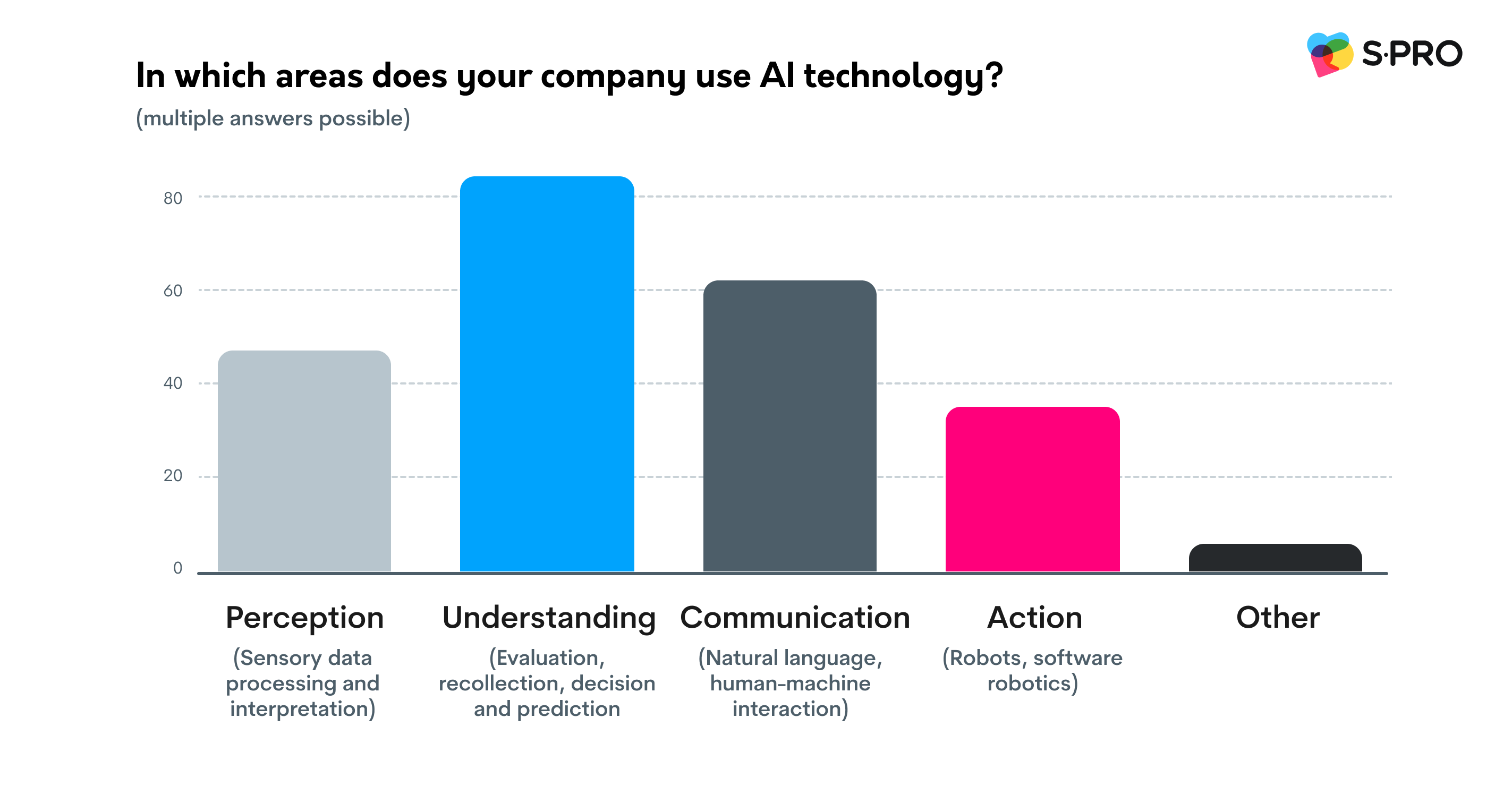The digital solutions employing Artificial Intelligence are booming. The global AI market size is expected to grow to $407 billion by 2027, accompanied by the growing business significance of AI and technological advancements. AI is already transforming a variety of industries, from fintech to healthcare. Therefore, a future-focused entrepreneur should keep an eye on Artificial Intelligence trends.
Let’s review the statistics of AI in Switzerland and the speed with which Swiss companies implement AI technologies in their everyday lives.
Here’s a fact: Because of its strong ecosystem of life science industries, Switzerland ranks third in the world in the number of AI-related patents per capita, particularly for industries in the health sector.
Moreover, Switzerland boasts a leading number of institutions in this field, such as the Idiap Research Institute, Center for Artificial Intelligence in Medicine (CAIM), and Institute of Artificial Intelligence and Complex Systems (iCoSys) at the School of Engineering and Architecture of Fribourg.
According to Statista, the market size in the Artificial Intelligence market in Switzerland is projected to reach US$1.74bn in 2024. The market size will grow with an annual growth rate (CAGR 2024-2030) of 28.16%, with a market volume of US$7.71bn by 2030.
According to the Swiss AI report, which surveyed around 100 AI companies in Switzerland on their current and future use of AI technologies, almost 80% of the companies surveyed have an independent or rudimentary AI strategy. Moreover, 65.5% of the companies surveyed want to increase the efficiency of processes using AI technology – for large companies, this goal is even the top priority at 90.5%.
AI is introduced to improve different areas such as customer services, healthcare, decision-making, and strategy. According to the survey, around 50% of respondents see AI market trends as new opportunities in these areas for the Swiss industry.
In this article, our AI development company S-PRO focused on determining the AI trends 2024 in Switzerland. This country is one of Europe’s main AI technology hubs. It has the record number of AI companies per capita in the European Union and tops the lists of Global Innovation Index and Global Talent Competitiveness Index. Watching the AI trends in this country will help you anticipate similar tendencies in other countries. Sounds interesting? Read on!
15 Artificial Intelligence Trends in Switzerland in 2024
We have analyzed information from various sources, including the Swiss AI Report and another Artificial Intelligence report produced by HSLU (Lucerne University of Applied Sciences and Arts). We’ve also relied on our expert intuition, originating from rich experience in the field. Our research resulted in trends we expect to shape the future of AI in Switzerland and beyond.

AI gaining strategic business significance
Perhaps, the key AI trend in Switzerland is that using these technologies is no
longer an exploratory activity. According to the Swiss AI Report, they have already reached strategic relevance. Almost 80% of the surveyed companies already have some AI strategy. Furthermore, 12% intend to build their strategy accounting for the AI context.
The growth of AI budgets
At present, Swiss companies don’t invest much in implementing Artificial Intelligence, but the situation is about to change. Less than a third of the Swiss AI report poll participants have dedicated AI budgets. Moreover, just under 75% of the companies reported spending less than CHF 1 million (around $1 million) annually on AI development. However, 32% claim they intend to increase their budgets by more than 100%. Only 12% do not plan to make any adjustments.
Insight-mining and communication as the leading AI use cases
Swiss companies view Artificial Intelligence as an instrument to get maximum business value from data and foster efficient communication. Swiss AI Report points out that most use AI to mine insights from data sets and produce better predictions. Communication is the second most popular option. That includes such widespread implementation of Natural Language Processing technologies as chatbots.

The authors of the HSLU report reach the same conclusion. The researchers emphasize that predictive analytics is the most common AI use case. For example, the interviewed executives mentioned predicting the probability of a patient re-entering the hospital or employing predictive maintenance to keep equipment in working order. Natural Language Processing and computer vision were the next items on the list.
If your company needs to use AI for any of the purposes mentioned above, check out our AI and machine learning development services. We have expertise in time series analysis, clustering, automated data insights, text analysis, classification, summarization, and generation, as well as image, audio and video analysis.
One of our projects illustrates how AI can significantly boost data-analysis capabilities.
S-PRO’s case study: Insight-generating AI for the energy market
We helped our client, the owner of an energy market analytics platform, to gain a competitive edge by utilizing a modern machine learning and data stack. During this project, we’ve made the following contributions to the platform:
- ML-powered data analytics
- automated trends and seasonality discovery
- demand forecasting model
- reinforcement learning agent acting upon market change
A huge volume of data from various sources is transformed and processed for our supply and demand forecasting models. The latter generates insights for automated decision-making both for energy consumers and producers.
You can find more of our AI projects in our portfolio.
The intensifying race for AI tech talents
The growing number of AI projects means that the competition in the Swiss AI labour market is likely to increase. Local companies struggle to compete with international digital juggernauts that recruit promising talents early during their education. The AI-related positions with the greatest demand are:
- data scientists — 39% of companies interviewed for the Swiss AI report
- machine learning engineers — 31%
- data engineers — around 27%
As the HSLU research suggests, Swiss executives may favor graduates with little experience but wielding the latest insights into AI research. However, the “open-mindedness” of the candidates is also essential. The specialists should be able and willing to go beyond technical aspects and learn the specifics of the domain they work in.
In such a situation, the help of a reliable technology partner may come in handy. With S-PRO’s help, you can easily expand your engineering teams with skilful specialists. They have experience in implementing AI technologies in various industries, from hospitality to logistics.
Focus on the input data quality improvement
AI implementation faces various challenges. The list includes difficulties explaining an AI system’s decisions, eliminating biases, ensuring data security, lack of ethical standards in this sphere, etc.
However, the “garbage in — garbage out” problem seems to come first in the minds of Swiss execs. One in three companies interviewed for the Swiss AI Report mentioned data heterogeneity as the biggest problem. They are clearly worried about the inaccurate output directly impacting value creation. Therefore, the focus on ensuring the amount and quality of input data will be an AI trend in Switzerland.

We at S-PRO can wield a modern data stack to guarantee a stable and continuous data flow for your project. Moreover, our experts will pay close attention to the quality of data to ensure your AI solution generates real business value.
The strengthening cooperation with universities for AI projects
The proximity to the world-renowned academic institutions offers unique opportunities for the Swiss AI development teams. They can network with external research organizations to leverage cutting-edge technologies and approaches. It allows them to be better equipped to handle bias, improve traceability of AI decision-making, etc.
71% of the companies surveyed for the Swiss AI report claim they are in an exchange or cooperation with research institutions. Most executives interviewed by the HSLU researchers also claimed they work with universities. This current trend in Artificial Intelligence implementation is likely to remain relevant in the near future.

AI as the tool to boost efficiency, improve and generate offers
Many Swiss companies view AI solutions as a tool to change their present and shape their future, gaining competitive advantages. The most frequently mentioned tasks for AI are to improve existing products or services, optimize processes, and develop new offers. Efficiency boost is a fundamental objective for large companies. Consequently, we expect AI experts concentrating on such tasks to be one of the AI trends 2024.

Shift towards more autonomous AI solutions
Despite the image of AI in popular culture, endowing it with human-like self-sufficiency, real-world solutions often rely on humans for support and supervision. The Swiss AI report has shown that local companies rate the autonomy level of their AI systems quite low. More than half of companies use AI as a support tool. In other words, AI may help drive a car, but a human remains in the driver’s seat.
However, AI technologies are becoming more advanced, and the autonomy of automated systems is already relevant. 28% of the polled companies claim they implement AI in a way that allows the “driver” to “sit back.” It is safe to assume that another Artificial Intelligence trend will be the increasing autonomy of AI-based systems.
The advancements in language modeling
Language modeling allows machines to communicate with us in understandable language or even transform natural human languages into computer code. The most advanced language model up to date, GPT-3 (Generative Pre-Trained Transformer) by OpenAI, consists of around 175 billion parameters the machines can use to process language.
However, the next version, GPT-4, is expected to be even more powerful. According to some estimates, this new AI technology 2024 may be 500 times larger than GPT-3. In theory, such a potent tool will take us much closer to making conversations with a machine indistinguishable from those of a human. Moreover, AI solutions will become significantly better at creating computer code.
As we’ve mentioned, Swiss businesses that often use AI-based solutions for communication-related purposes are likely to spur the GPT-4 implementation.
AI-powered workforce augmentation
Fears that machines will replace humans in some roles haven’t been put to rest yet. Still, there is growing evidence that more and more specialists will find themselves working with or alongside AI-powered systems. Those solutions will augment their abilities and skills, boosting their efficiency.
Some AI tools have already become commonplace. For instance, smart marketing tools help to determine prominent leads or expected customer lifetime value. AI helps engineers with predictive maintenance, pointing out the machines that will need servicing or repairing ahead of time.
The preparations to embrace AI technology in Switzerland manifest themselves as efforts to increase AI literacy. Out of those businesses polled for the Swiss AI report, only 14% stated that they do not provide any training and information concerning AI technologies. 46% do so, and 40% are planning educational programs. It includes a wide range of activities: introductory events on machine learning and data science, AI courses for developers, video training, and conferences.
The combination of IoT and AI
The Internet of Things (IoT) is a term describing a variety of ‘smart’ objects equipped with sensors, processing ability, and software that exchange data via the Internet. The idea of combining AI and IoT isn’t entirely new. Some of the real-world examples of such synergy are manufacturing robots and autonomous vehicles.
However, the full potential of using IoT together with AI is yet to be harnessed. Many tech companies still struggle with extracting actionable insights from the torrent of data generated by ‘smart’ devices. Therefore, creating artificial ‘brains’ to tackle that task is likely to become an AI trend in Switzerland and other countries.
The rising popularity of no-code AI platforms
AI technologies are becoming increasingly more available as the entry barriers are reduced. Even a small company gets an opportunity to build its own AI solution thanks to special platforms allowing it to produce an AI-based solution without coding.
With such tools, development takes 90% less time in comparison to writing code ground up, troubleshooting, and debugging. Drag-and-drop functionality makes creating your AI app much easier. Moreover, the cost of development is lower as you don’t need to maintain a large in-house data-science department.
As more and more companies in Switzerland and all over the world will want to implement AI into their products and services, the popularity of no-code platforms will soar. Keep in mind, however, that such platforms have their limitations. If you need a complex custom AI solution, the most cost-effective option will still be finding a reliable AI development company. Don’t hesitate to contact us if you have such a project in mind.
AI facilitating the advance of a metaverse
The term ‘metaverse’ usually refers to an immersive virtual world facilitated by the use of augmented reality and virtual reality headsets. Aside from VR and AR, it is believed to be fostered by such technologies as blockchain, 5G, and Artificial intelligence.
Meta (formerly Facebook) has already announced the development of a record-breaking supercomputer to power its metaverse. Moreover, the IT juggernaut clearly plans to build several huge AI systems that will drive this virtual world.
AI may facilitate the creation of online environments that will be comfortable, entertaining, and creativity-stimulating. We may even get used to interacting with AI assistants that will boost our productivity or allow us to have more fun. It is likely that metaverse development will grab the attention of AI professionals in Switzerland and other countries in 2024 and the next few years.
AI-boost in cybersecurity
At the 2021 World Economic Forum, 39% of the poll participants identified cybersecurity failures as a critical threat to the world in the near future — slightly more than terrorist attacks. The growing number of devices people use results in more potential points of failure. The increasing complexity of networks makes identifying those points more challenging.
AI can be used to address this alarming trend. Smart algorithms can analyze network traffic and learn to recognize suspicious patterns suggesting criminal intentions. Therefore, in many countries, including Switzerland, the rise of AI applications in cybersecurity is expected.
Best AI Companies in Switzerland
S-PRO
Website: https://s-pro.io/
Address: Dammstrasse 16, 6300, Zug, Switzerland
S-PRO is an AI and machine learning development company that helps companies automate their day-to-day operations and overcome complex challenges through AI software development services.
If you want to integrate AI into your infrastructure to improve customer service, eliminate human errors, and streamline your internal processes, the S-PRO team has all the necessary experience. Its main services include:
- Machine learning solutions design and development
- Natural language processing
- Computer vision
- Expert systems
- Voice and speed recognition
- Neural networks
- Predictive analytics and maintenance
If you need consultancy on integrating AI market trends into your business, get in touch with the S-PRO team to discuss how AI can improve your product.
Ti&M
Website: https://www.ti8m.com/en/
Address: Buckhauserstrasse 24, 8048 Zurich
TI&M is a Swiss company with significant experience in implementing AI technologies to help companies solve their problems and optimize their processes.
Their team will analyze your current needs and the data you use to provide you with suggestions on what can be improved with the help of AI and machine learning. TI&M’s main services include:
- Computer vision
- AI assistant development
- Big data and analytics
- Leadership training on generative AI
- NLP
- Machine learning
Pixellete Technologies
Website: https://www.pixelettetech.com/
Address: Dinergy Partners GmbH Bellevueweg 36B 6300 Zug Switzerland
Pixellete Technologies will help you evaluate your business with AI technology. Their team has experience in implementing AI in different sectors, such as financial services, retail, public sector, tourism, media, etc. Their team has expertise in integrating such AI technologies as OpenAI, Azure, and Gemini. They also have experience in business process optimization using AI and creating AI systems that help you meet your strategic business objectives. Their main AI services include:
- Chatbots and conversational AI
- Computer vision
- Recommender engines
- Digital processes automation and optimization
- Custom AI services
Embrace the future of AI together with S-PRO
In 2024 and the following years, Artificial Intelligence is likely to become increasingly more important for Swiss businesses. Far from being an experimental technology, AI is viewed as a valuable tool for optimizing business operations, improving existing offers, and generating new products and services. Swiss companies are ready to invest more in AI, getting more insights from vast datasets and boosting communication capabilities.
To benefit from Artificial Intelligence, however, companies have to overcome various challenges. The list includes ensuring sufficient data quality and securing knowledgeable and experienced professionals for their AI teams. This is where a reliable technology partner can come in handy. S-PRO can become such a partner for you.
Our team of data engineers, data scientists, and ML engineers can create custom digital solutions to provide a sustainable AI-driven ecosystem for businesses of all sizes. We are a trusted AI and machine learning development company with eight years on the market and more than 150 delivered projects. Get in touch, and our representative will contact you within a day!
FAQ
What is Artificial Intelligence?
AI is an umbrella term uniting a wide range of techniques that allow digital systems to mimic human thinking. When we think, we sense what is happening in our environment, attribute meaning to those events, make decisions, and act. AI solutions are in the early stages of replicating these behaviours.
What are the advantages of Artificial Intelligence?
Artificial Intelligence technologies have tremendous potential and can revolutionize any industry. Here are their key benefits:
- Human error reduction
- 24/7 availability
- Repetitive task automation
- Human resources augmentation
- Faster decision-making
- Problem-solving capability boost
Artificial Intelligence, machine learning, and deep learning — how are they different?
All three terms are linked, but they are not synonyms. Machine learning is a subset of AI, while deep learning, in its turn, is a subset of machine learning. Machine learning enables software systems to shape their behavior according to input data (‘learn’) rather than being externally offered a set of rules for how to act.
Deep learning is a machine learning technique using artificial neural networks. The latter are computing systems loosely modeling the biological neural networks — human and animal brains. ANNs can spot patterns and correlations in raw data, classify and cluster it, continuously learning and improving over time.
Can AI algorithms be biased, and how to avoid it?
If the dataset an AI model uses for training is biased, the algorithm will also become biased. That’s why collecting diverse and robust data is of prime importance for AI development. For instance, you may want to sample data from various demographics and geographies. If bias is spotted in algorithms, the training data should be carefully examined and, if necessary, amended. Should you choose to develop an AI solution with S-PRO, our experts will ensure your algorithms are bias-free.





